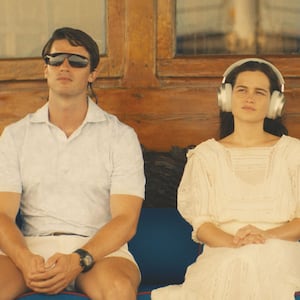High-minded pulp of an entertainingly spirited sort, The Gorge melds T.S. Elliott and the Ramones with sci-fi action-horror reminiscent of Resident Evil, Doom, and The Last of Us, all with a dash of romance thrown in for good over-the-top measure.
Such a smorgasbord of tones and elements often results in tonal schizophrenia, but Scott Derrickson (Sinister, Doctor Strange, The Black Phone) adeptly vacillates between meet-cutes and machine gun fire, explosions in the bedroom and, also, on a remote battlefield where two snipers are ordered to protect a mysterious ravine for military bigwigs. With leads Anya Taylor-Joy and Miles Teller generating considerable sparks, and violent set pieces that up the supernatural ante one out-there revelation at a time, the director’s latest proves a bonkers B-movie on a big-studio budget.
Premiering on Apple TV+ on Feb. 14, The Gorge is about two kindred spirits who hail from opposite ends of the Earth. In Lithuania, Drasa (Taylor-Joy) reunites with her father at her mother’s grave to give him the shell casing from her most recent successful assassination—a gesture that represents her burying her secrets with him. Drasa’s dad isn’t long for this world and this is their farewell, since she’s being shipped off to parts unknown by her Russian benefactors to lay low.
At the same time, PTSD-afflicted American sharpshooter Levi (Teller) is summoned to his old Marine Corps base to speak with Bartholomew (Sigourney Weaver), a muckety-muck who knows that he was deemed unfit for his last potential assignment. The depressed and lost Levi says that he didn’t contest that assessment because “there’s not a lot of reasons for me right now,” but Bartholomew gives him a purpose: a mission so classified, he isn’t even told where he’s going.

Parachuting into an unidentified country, Levi follows instructions to a giant concrete tower on the edge of a misty chasm, where he connects with J.D. (Sope Dirisu), the man he’s relieving, who informs him that he’ll be spending the next year at this stronghold, alone, just like his counterpart in the tower on the other side of the gorge.
In an exposition dump that would be offensive if it wasn’t intended to overwhelm us in the same way that it does Levi, J.D. explains that since the end of WWII, Western and Eastern nations have annually sent a guard to this remote locale to man their respective outposts. J.D. doesn’t have any idea what nation they’re in, or who’s calling the shots. Nonetheless, he does know that they can only reach their superiors via a single monthly radio call, and that their task is to maintain the automated gun turrets, mines, and “cloakers”—satellite-y devices that hide the gorge from electronic detection—that line the abyss’ lip.
Aside from J.D.’s unceremonious exit from the station—which italicizes that something shady is going on here—The Gorge keeps its particulars hidden so that audiences can discover them along with the protagonists, and Zach Dean’s clever mash-up script takes its time doling out enlightening details.
For their first few months on this weird job, Levi and Drasa patrol and repair their containment fence, and on her birthday, the two strike up a (forbidden) conversation using giant notepads, white boards, and binoculars. Amour blossoms, motivating Levi to devise a means of reaching Drasa, and when he succeeds, the two find that they’re even more compatible than imagined. No sooner have they united, however, then they’re torn apart when Levi, during his return trip home, plummets into the ravine, motivating Drasa to leap in after him.

(Warning: Some spoilers follow.)
By this point, The Gorge has divulged the true nature of its characters’ undertaking: to prevent the gorge’s vicious creatures from escaping confinement. These beings are named the “Hollow Men” after Elliott’s famous poem (Levi knows this because he writes verse), and they resemble demonic people made out of twigs and vegetation.
They can scale the canyon’s rocky walls with amazing speed and they howl like unholy beasts, and though Levi and Drasa can’t initially confirm or deny it, they seem a lot like denizens of Hell, which J.D. believed was accessible via the gorge. An initial firefight between the duo and the monstrous horde establishes their formidable ferociousness. Thus, when Levi falls into the valley and Drasa follows, their fortunes appear quite dire.
That they are, and yet this catastrophe is just the beginning of The Gorge’s second half, during which it transitions from an enigmatic separated-but-united romance into a combative survival-horror nightmare.
Levi and Drasa ascertain that they’re in a polluted wasteland that was once some sort of civilized community, and that they’re in grave danger of being overrun by the Hollow Men, who are at once savage and human, as underscored by their shocking mode of attack in an initial on-the-ground skirmish. Derrickson orchestrates this carnage with a sure hand, and as his heroes strive to stay alive, he partakes in at least one of his favorite devices, having the duo learn about the origins of their predicament—and this toxic holocaust—via a grainy black-and-white film viewed via a projector.
The more the Hollow Men take center stage, the more the film prioritizes two-against-many warfare. Still, Teller and Taylor-Joy are well-paired and their affectionate rapport enhances the story’s peril and urgency. They’re equally adept at wielding firearms and hacking and slashing their way through gnarly fiends, and Derrickson gives them plenty of chances to strut their lethal stuff.

Ultimately, The Gorge races toward bombshells that are pleasurably loopy and a finale that pits them against the malevolent powers-that-be, and if it concludes somewhat flatly—a fate which similarly defines its coda—that only slightly detracts from the preceding mayhem’s liveliness.
In a prior era of robust theatrical distribution, The Gorge would have been a programmer fit for a Friday night. Even in today’s streaming landscape, however, its craft—both in front of and behind the camera—makes it a solid example of nifty genre hybridization. Better yet, in Weaver’s enjoyable supporting turn as a corporate titan with potentially nefarious intentions, she corroborates The Dark Knight’s oft-quoted belief that you either die a hero or live long enough to become the villain.








